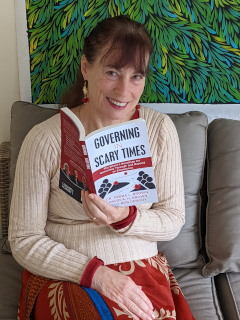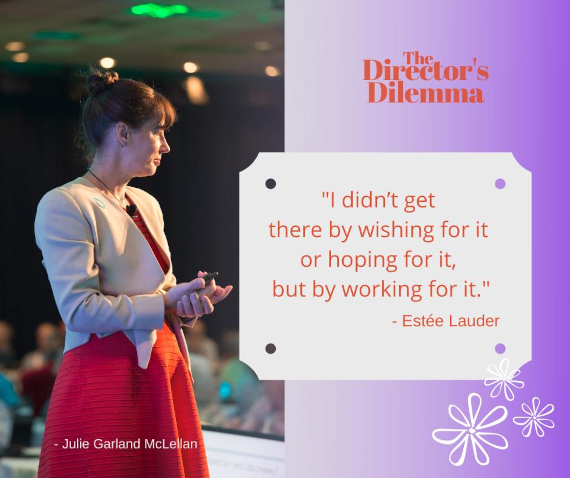|
|
|
|
|
|
|
|
|
Dear reader,
Welcome to The Director's Dilemma June 2022
Each month this newsletter looks at a real-life scenario that happened to a board, perhaps to a board like yours, and considers a range of responses. The scenarios are de-identified to protect the individuals concerned. This month we look at the conflicts that arise when chair and CEO relationships become entangled and conflicts are not well managed.
I work with boards and directors as a confidential mentor to help them build great companies and maximise their impact, and if you would like coaching from an experienced board mentor, please call me.
To read this email in a web browser, go to www.mclellan.com.au/newsletter.html and click on 'read the latest issue'. I hope you will enjoy the latest dilemma:
 Sonja chairs the audit committee of a large not for profit organisation that is building a major asset and has a strategic plan with a pipeline of more large developments. Although the organisation has large budgets and complex operations, the board are all passionate volunteers. Sonja chairs the audit committee of a large not for profit organisation that is building a major asset and has a strategic plan with a pipeline of more large developments. Although the organisation has large budgets and complex operations, the board are all passionate volunteers.
Recently the CEO, who is well paid for the NFP sector but not remunerated at the level of commercial companies with similar scope and developments, announced that he had been headhunted and intended to accept an offer of employment elsewhere. The board were sad to lose him but wished him great success in his future and started work briefing a search consultant to find a replacement.
To the board's consternation, the board chair announced that he wished to apply for the role. He also wished to remain on the board and, if successful, become a Managing Director.
The board removed the Chair from the nominations committee and proceeded with the search process. The consultant put together a very strong shortlist of skilled people with a passion for the cause and recent relevant industry experience. The Chair didn't make the shortlist and immediately demanded to be reinstated on the nominations committee to 'resume good governance of the recruitment process'. The board agreed and an excellent candidate was soon appointed.
The new CEO has settled in well and is doing a good job but his relationship with the chair is fraught. The chair is overly critical in meetings. The chair claims the CEO is less experienced and should submit to firm guidance.
Yesterday the CEO told Sonja, informally, that he was considering looking for another role because he was finding the chair too invasive and feeling unsupported. He hasn't started looking yet, but he doesn't want to continue like this.
How should Sonja handle this news?
|
|
|
|
Carmel's Answer
 It is worthwhile stating upfront, that the role of a Chair and CEO are quite distinct, and that the Chair should have been very aware of this before applying for the role. Nevertheless, this is not the first time that Chairs have felt that their knowledge of the business places them in an ideal position to lead the organisation in the top executive role. It is worthwhile stating upfront, that the role of a Chair and CEO are quite distinct, and that the Chair should have been very aware of this before applying for the role. Nevertheless, this is not the first time that Chairs have felt that their knowledge of the business places them in an ideal position to lead the organisation in the top executive role.
The Chair should have considered the implications of his application on the Board and the whole organisation. Both a successful and unsuccessful result would place the Board and the organisation in a high-risk position.
The Nominations Committee should have stated the implications and ramifications of either alternative to the Chair prior to the process commencing. These alternatives would be based on external governance advice.
A Chair who is unsuccessful in securing the CEO role, should be asked to leave as they now have a conflict of interest in the Chair role. They could remain in a position of Board director but not be in a position where they are responsible in mentoring and completing performance reviews on the CEO.
It would appear from the scenario that the above did not occur prior to the results being announced.
Sonja must speak to the Nominations Committee Chair and discuss the situation. An Out of the ordinary Board meeting should be called, without the Chair, to vote whether the Chair should remain. If unanimous, either the Vice-Chair and/or Chair of Nominations should advise the Chair of the result. A Chair will then need to be elected at the next proper Board meeting.
Carmel Macmillan is a former director of Women on Boards, Health Consumers Queensland, Multiple Sclerosis Society of Queensland and the Mater Foundation. She is a Fellow of the Australian Institute of Company Directors and the Governance Institute of Australia. She is based in Queensland, Australia.
|
|
|
|
Julie's Answer

Oh dear, poor Sonja!
Okay, enough sympathy, now get to work.
This is an important piece of information that the CEO shared for a reason. There is a real risk of losing a good CEO and Sonja can't ignore that.
First, she needs to talk to her fellow directors and verify her feeling that the chair is overly critical of the CEO. This is likely best done in a series of coffees or one on one zoom meetings. If that can't be arranged she should convene a meeting of the audit committee and invite the other directors, but not the chair, to attend.
If other directors feel that the chair is overstepping the mark, then someone should talk with him and give him an option to improve his behaviour. Ideally that should be his closest friend on the board.
If the chair, who seems to have been okay until recently, wants to improve then the board should insist on external coaching support for him and on some measurables that will be monitored to ensure the behaviours do change.
If the chair doesn't want to change then the board will need to remove him from the chair position. The constitution will say if that can be done by the other directors or if it needs to go to a members' vote at an EGM. If the directors can remove the chair it is likely that he will remain as a director and, again, the board must insist on decent behaviour or take further steps.
Julie Garland McLellan is an experienced non-executive director and board advisor based in Sydney, Australia. She travels the world providing director education and board development.
|
|
|
|
Harry's Answer
 The CEO is in a difficult dilemma being accountable to the Board but feeling that the Chair is not being supportive. The CEO is in a difficult dilemma being accountable to the Board but feeling that the Chair is not being supportive.
High performing Boards tend to focus on the following:
-
Strategy - contributing to and monitoring company strategy, and managing resources;
-
Accountability - understanding of role and focus, maintaining an effective governance framework and ensuring compliance;
-
Relationship building - developing a constructive partnership with the Chief Executive and the Board and implementing internal practices such as thinking about the Board structure, make up, and meetings;
-
Dynamics - creating a culture that encourages contribution, challenge, independent-mindedness, trust and respect, and continuous learning and self-improvement.
Sonja's Board is falling short in Relationship Building. We assume the Chair is behaving this way because they feel they could perform the CEO role better than the incumbent. It is the responsibility of the whole Board to ensure that proper behaviours are adhered to.
Certain tenets are recognised as a mark of a good Chair, including:
-
achieve openness and transparency at the Board and work continuously to improve Board performance as well as running a flexible process;
-
be personally accountable for the Board performance but balance regulation with strategy;
-
they should not previously be the Chief Executive, have broad-based rather than sector specific experience and work well with the Chief Executive.
Sonja should encourage the CEO to continue to try and build a constructive relationship with the Chair.
At the same time, if the Audit Chair and the other Non-Executive Directors agree the Chair's behaviour is not acceptable, they should address this with the Chair. In the UK, the Senior Independent Director is responsible for leading the other Non-Executive Directors in holding the Chair to account. The Financial Reporting Council UK Corporate Governance Code suggests she "...serve as a sounding board for the Chair and act as an intermediary for other directors". Annual meetings of non-executives, without the Chair present, to appraise the Chair's performance may help. As Audit Committee Chair Sonja is likely the Senior Independent Director and should lead this process.
Harry Friend is a Partner of the Inzito Partnership. He has over 20 years of global search experience including numerous CEO and board roles. He is based in London, UK.
|
|
|
|
Short practical videos
My recent video on how to read board papers was the most popular I have ever posted. You might like to visit and subscribe to my YouTube channel to see that and all the other videos. There are 55 short videos on a range of topics. Let me know of any topics you would like to see addressed and I will see if I can make a video for you.
Book Review - Governing in Scary Times by Dr Debra Brown, David Brown and RobDerooy.

This is a very practical book. It is based around key themes that the authors have noticed in their own board work as they navigated the pandemic. They have made these themes 'non crisis specific' so that they can be applied to anything that could conceivably happen to a board and then they have kept the focus at board level by organising ideas around key questions a director might ask.
I loved the new corporate scorecard in chapter 9. It will be a source of inspiration as I conduct reviews in the future.
The inclusion of strategies for opening and maintaining conversation with stakeholders is simply great. The chapter on attracting and retaining employees in the new economy breaks some prospective new ground, again, at the board level and without unnecessary detail. My copy is dog eared already! So will yours be, if you decide to get a copy and see how it helps you to emerge from every crisis stronger and more capable than before.
Available at Amazon.com
Inspirational quote for June
This month my favourite quote is:

Directorship is hard work. I can't think of anything I would rather do or any better way to govern complex organisations in a changing environment. But, if you find yourself feeling that it is too hard, perhaps you need to reach out for some help.
Hear from The Governance Guys - I always enjoy The Governance Guys' podcast. This month was even more fun than usual because they invited me to join them. We talked about the difficult things directors sometimes have to do. Expect the unexpected!
https://thegovernanceguys.com/2022/04/27/episode-22-dealing-with-dilemmas-that-directors-face-with-julie-garland-mclellan
Focus your director and board development
Boards often struggle to get cut through and drive company performance. They work hard, then they work harder, then call in a consultant who recommends some changes, then they work harder still.
If that sounds like your board, don't worry. It is likely that you have simply been focusing on the wrong stuff. I have made a diagnostic tool that might help you to prioritise the actions that will free your board from the drudgery and allow you to maximise your impact. You can take the diagnostic here:
https://directorsdilemma.scoreapp.com
Call me afterwards for a personalised action plan to revitalise and enhance the impact of your board work.
A note on names - A few readers have asked me where I find the names for the protagonists in each case study; I 'borrow' them from people I meet or things that I read. Sonja as a girl's name is of English and Greek origin, and the meaning of Sonja is "wisdom". Our protagonist will need to display wisdom in solving this dilemma.
This newsletter - If you have any ideas for improving the newsletter please let me know. If you are reading a forwarded copy, please visit my website and sign up for your own subscription.
Suggestions for dilemmas - Thank you to all the readers who have suggested dilemmas. They are greatly appreciated. I will answer them all eventually. I could not write this newsletter without your help and without the generous help of all the experts who respond each month to the case studies.
Be a contributor - if you would like to attempt a response to the dilemmas for publication you will be most welcome. Simply reply to this email and let me know. I am always on the look out for new talent from around the world so please reach out if that sounds like something you could do. I am also always grateful for the generous sharing of the current and past contributors. I couldn’t create such an engaging newsletter without their help.
Let's connect - I use LinkedIn to share information about boards and directorship with my friends and acquaintances. If you use LinkedIn and we are not yet connected I will welcome a connection from you. You can find me at linkedin.com/in/juliegarlandmclellan.
Let me help you - I would be delighted to speak for or train your board, staff, audience and/or group. If I can help, please contact me at julie@mclellan.com.au.
Farewell until the next issue due 1 July 2022. I look forward to greeting you again then.
Enjoy governing your companies!
Best regards,
Julie

Main Photo by Gustavo Fring from Pexels (I kid you not - that is the photographer's name)
Quote Illustration by Julie Garland McLellan
Disclaimer:
The opinions expressed above are general in nature and are designed to help you to develop your judgement as a director. They are not a definitive legal ruling and do not constitute legal advice. Names and some circumstances in the case study have been changed to ensure anonymity. Contributors to this newsletter comment in the context of their own jurisdiction; readers should check their local laws and regulations as they may be very different.
Privacy: I am privileged to have your contact details and keep them as safely as possible. I will alert you if they are ever accessed by any unauthorised person (the technical staff at ayuda help with publishing and issuing the Director's Dilemma and have access so they can send the newsletters to you). I do not sell your details to anyone; they are kept only for the intended purpose - sending you this newsletter and helping to build the judgement of company directors by providing a safe way to consider potential responses to real life events.
|
|
|
|
|
|
|
 Sonja chairs the audit committee of a large not for profit organisation that is building a major asset and has a strategic plan with a pipeline of more large developments. Although the organisation has large budgets and complex operations, the board are all passionate volunteers.
Sonja chairs the audit committee of a large not for profit organisation that is building a major asset and has a strategic plan with a pipeline of more large developments. Although the organisation has large budgets and complex operations, the board are all passionate volunteers.
 It is worthwhile stating upfront, that the role of a Chair and CEO are quite distinct, and that the Chair should have been very aware of this before applying for the role. Nevertheless, this is not the first time that Chairs have felt that their knowledge of the business places them in an ideal position to lead the organisation in the top executive role.
It is worthwhile stating upfront, that the role of a Chair and CEO are quite distinct, and that the Chair should have been very aware of this before applying for the role. Nevertheless, this is not the first time that Chairs have felt that their knowledge of the business places them in an ideal position to lead the organisation in the top executive role.
 The CEO is in a difficult dilemma being accountable to the Board but feeling that the Chair is not being supportive.
The CEO is in a difficult dilemma being accountable to the Board but feeling that the Chair is not being supportive.

